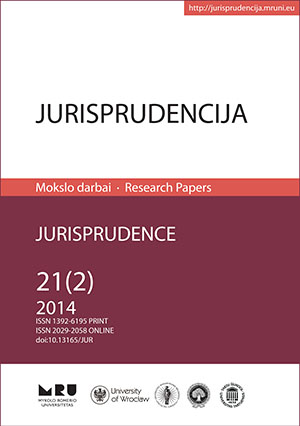Europos Žmogaus Teisių Teismas –
konstitucinė justicija prieš individualią?
The European Court of Human Rights: Constitutional Justice Versus Individual?
Author(s): Lyra JakulevičienėSubject(s): Law, Constitution, Jurisprudence
Published by: Mykolas Romeris University
Keywords: The European Court of Human Rights; individual justice; constitutional justice; ECtHR reform; 14 Protocol of ECHR; 15 Protocol of ECHR; 16 Protocol of ECHR
Summary/Abstract: The European Court of Human Rights (hereafter – the Court) is considered as the most successful guarantee of individual justice in the world. At the same time, the price of its success is high – there is a constantly increasing number of individual petitions to such an extent, which the Court is unable to handle. In this context, while the reforms of the Court’s operation and the Convention for the Protection of Human Rights and Fundamental Freedoms (hereafter – the Convention) are inevitable, tendencies confirm that the Court is more and more embarking on the constitutional justice path. But the consequences of such reforms are still not clear and there are few scholars interested in its’ analysis from the perspective of an individual. For instance, can we prove that constitutional justice is a key to the Court’s backlog problem without at the same time denying the right to individual justice for some individuals, or that it protects the rights of individuals more effectively? And what is better for an individual overall? The author of this article aims to address these questions and for that purpose identifies and evaluates the features of the constitutional justice in the Court and what it means for an individual justice in the context of current and upcoming reforms of the Court (namely 14, 15 and 16 Protocols to the Convention). The article is composed of three constituent parts. Firstly, the author seeks to determine how far the Court has developed towards a body of a constitutional justice. Secondly, the author analyses the tendencies of constitutionalisation of the Court in the context of most recent reforms. Lastly, the author presents arguments for and against constitutionalisation of the Court from the perspective of an individual. Having analysed the history of the Court’s establishment, its’ mission, functions, role, objectives of the Convention itself, doctrines and principles applied by the Court, as well as the nature of its decisions and other factors, the author states that the nature of the Court is heterogeneous, thus, it captures the elements of both types of justice. However, what is clear from the recent Court reforms is that the constitutional justice elements take the lead, in particular through introduction of pilot judgment procedure and various restrictions on individual petition (including those that may arise as a result of effectively applied advisory opinion). At the same time, the Court so far is not empowered to repeal or invalidate the legal acts infringing on the obligations under the Convention, it leaves extensive discretion to national bodies and grants an individual relief. Though this is not yet discussed to such an extent, but thinking ahead, resorting only to constitutional justice in the Court without maintaining individual justice in the future would neither be practical nor feasible, as assessment of compliance of states’ obligations can only be made with minimum concreteness, possible only in an ind
Journal: Jurisprudencija
- Issue Year: 21/2014
- Issue No: 2
- Page Range: 373–398
- Page Count: 26
- Language: Lithuanian

